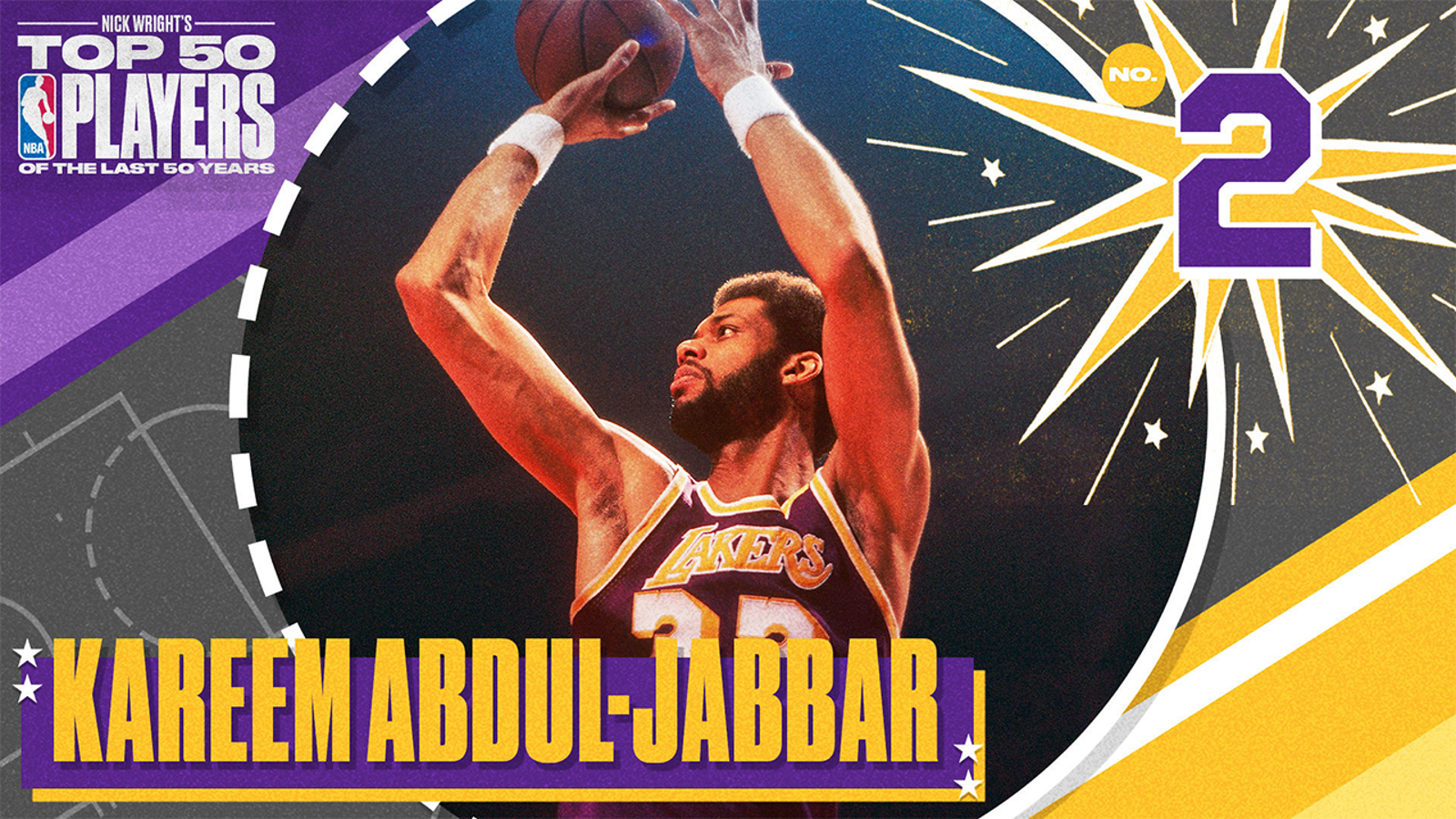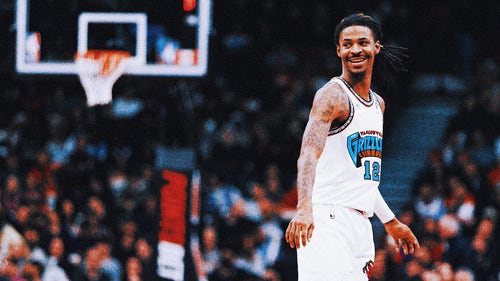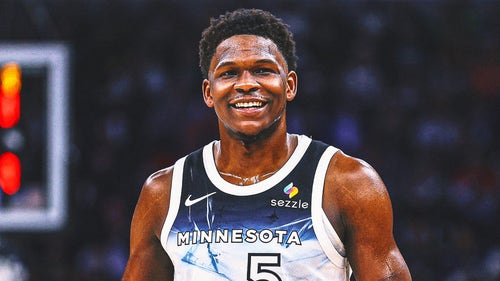
Top 50 NBA players from last 50 years: Kareem Abdul-Jabbar ranks No. 2
Editor's Note: As part of a new series for his podcast, "What’s Wright with Nick Wright," FOX Sports commentator Nick Wright is ranking the 50 best NBA players of the last 50 years. The countdown continues today with player No. 2, Kareem Abdul-Jabbar.
Kareem Abdul-Jabbar’s career highlights:
- Two-time Finals MVP
- Six-time league MVP
- 19-time All-Star
- 10-time first-team All-NBA, five-time second team
- Five-time All-Defensive first team, six-time second team
- Two-time scoring champ
- 1976 rebounding champion
- Four-time blocks leader
- 1970 Rookie of the Year
- First on all-time scoring list
- Third on all-time rebounding list
By the time Kareem Abdul-Jabbar finally retired from basketball, he’d played better and for longer than anyone ever had. He’d made the most shots, scored the most points and earned the most MVPs.
More than three decades later, he still holds those records and several others. But he’s curiously fallen out of the conversation for the greatest player of all time.
"The GOAT debate is almost always constricted to LeBron [James] and Michael [Jordan]," Wright said. "But there is a third person that by any measure should be included, and that is Kareem Abdul-Jabbar."
Kareem Abdul-Jabbar is No. 2 on Nick Wright's Top 50 NBA Players of the Last 50 Years
For more than half of his 20 seasons, Kareem had no peers.
He arrived in the NBA in 1969 as Lew Alcindor, the most decorated amateur player ever. He was so good in college that the NCAA outlawed dunking following his first varsity season at UCLA. Legendary coach John Wooden told Abdul-Jabbar it would ultimately make him better. No kidding. The restriction prompted the nimble 7-foot-2 center to develop the skyhook.
"The most unstoppable, unblockable shot in NBA history," Wright said.
Kareem was an immediate superstar in the league, his 28.8 points and 14.5 rebounds per game turning the expansion Milwaukee Bucks into title contenders. They fell three wins short of the 1970 Finals, losing to the eventual champion New York Knicks, despite Kareem’s 35-17-4 averages (with 57% shooting) in the postseason.
"So what does he do for Year 2?" Wright said. "He puts together what is up to that point the single greatest season in NBA history, start to finish."
Kareem posted an NBA-best 31.1 points with 16.0 rebounds as Milwaukee won 66 games, which was the second-most ever at the time. The league MVP then averaged 27-17 in the postseason and recorded a double-double in every game, vanquishing Hall of Fame centers Wilt Chamberlain, Wes Unseld and Nate Thurmond in the process, while guiding the Bucks to a 12-2 mark and the title.
At 23 years old, he remained the youngest MVP until a future teammate would controversially win the award over him a decade later.
Statistically, Abdul-Jabbar was even better the following season. He went for 35-17-5 per game to repeat as MVP. Milwaukee’s bid to repeat as champs was cut down in the conference finals by a 69-win Lakers squad that would reel off a record 33 consecutive wins. It was arguably the best meeting between two teams outside of the Finals, and Kareem was by far the best player. He averaged 34-18-5 for the series, only to see Milwaukee lose three games by four points or fewer to the deeper Lakers.
In the 1973 postseason, Abdul-Jabbar struggled from the floor as the Bucks were upset by the Warriors in the opening round. It would be the only time in 18 career playoff trips that he’d bow out to a team that didn’t at least reach the Finals.
Kareem won his third MVP in four seasons in 1974 and then put together perhaps the best postseason run of his career. The Bucks’ lone All-Star averaged 32-16-5 over three rounds, carrying the team back to the Finals. He sank a last-second skyhook to force a Game 7, only to see Milwaukee fall to a Celtics bunch featuring three Hall of Famers in their respective primes.
"I believe this is the first Finals MVP that he was robbed of even though they lost in the Finals," Wright said. "By the way, they had just given the Finals MVP to a losing player a few years prior in Jerry West. So it wouldn’t have been at all unprecedented."
The following season was a bit of a lost one for Abdul-Jabbar. He wanted out of the Midwest and requested a trade, and then broke his hand in the preseason. The club plummeted without his services for a month and missed the playoffs. In 1975, he was traded to the Lakers, who were in the midst of their own rebuild. They, too, fell short of the postseason with Kareem, despite him winning league MVP.
He'd win a second straight MVP and compete for two more, but the club won just two playoff series over his first four years in L.A. And then Magic Johnson arrived. The rookie wonder’s unique skill set blended beautifully with that of Abdul-Jabbar, who went on to win a record sixth league MVP. Moreover, Magic's boisterous personality fittingly contrasted with the introverted giant, whom teammates reverently addressed as "Cap." It all added up to the "Showtime" Lakers becoming a juggernaut.
Kareem owned the first five games of the 1980 Finals, including a 40 and 15 performance to give L.A. a 3-2 series lead over the Philadelphia 76ers. But a severely sprained ankle sidelined the ironman for Game 6. That’s when Johnson, of course, jumped center and dropped 42-15-7 to clinch the title. He was soon awarded Finals MVP, having averaged 22-11-9 with three steals for the series. Abdul-Jabbar put up 33-14-3 with five blocks.
"This is the second time I think he is robbed of a Finals MVP," Wright said.
Kareem responded with another dominant campaign in 1981, yet the Lakers were upset in the first round by Moses Malone and the Rockets. Through a dozen seasons, Abdul-Jabbar had averaged 28-14-4 in the regular season and 30-16-4 in the playoffs.
"If he stopped playing after the first 12 years of his career, he would be a top-10 player ever," Wright said.
But at 34 years old, Cap wasn’t close to finished.
He remained a top-10 player while taking turns with Magic in leading the Lakers to the next four Finals. The duo guided L.A. to a 12-2 postseason mark in 1982, again toppling the Sixers. In the 1983 playoffs, Kareem eclipsed 30 points six times and averaged 27.1. The Lakers were just no match for a Philly squad spearheaded by Malone at his peak and Julius Erving at the end of his prime.
"This marks Kareem moving into a slightly different phase of his career," Wright said. "He’s no longer playing like [a] world-beating juggernaut every single night. Instead, he saved those for the biggest nights."
Soon after breaking Chamberlain’s all-time scoring mark late in the regular season, Abdul-Jabbar topped L.A. in scoring (26.6) and rebounding (8.1) against the Boston Celtics in the 1984 Finals. His 30-10-5 performance sparked a Game 6 win and a game-high 29 points in the deciding contest. Boston prevailed, however, as Magic struggled in Games 5 and 7.
In the 1985 Finals rematch, Cap really turned back the clock. His 30-17-8 ensured the Lakers evened the series following a 34-point loss in Game 1’s "Memorial Day Massacre." Abdul-Jabbar put up 26-14-7 in a Game 3 rout, 36-7-7 in a Game 5 victory and 29 and 7 to seal the series. He had just turned 38 years old, taking on arguably the greatest frontline in basketball history, and he was Finals MVP (26-9-5, 60%).
"What Kareem did in that ‘85 season is just utterly remarkable," Wright said. "That playoffs, he’s older than LeBron is right now."
A full two years later, in the final episode of the Lakers-Celtics ‘80s trilogy, a 40-year-old Kareem went for a team-high 32 points in the clinching Game 6. For the series, he averaged 22 and 7.
Although Abdul-Jabbar played a more modest role in L.A.'s two ensuing Finals trips, he continued delivering in crucial games. In 1988, the Lakers were tied at two games apiece with Detroit when Kareem sprang for 26 points, and his two last-second free throws were the difference in Game 6 — the latter ultimately salvaging the league's first successful title defense since Bill Russell's Celtics.
"So, at 41 years old they don’t win that title without him," Wright said. "Hands down, the biggest play of their season, and they ran it for Kareem."
In the penultimate game of his career, and with Magic sidelined by an injury, a 42-year-old Abdul-Jabbar collected 24 points and 13 rebounds in an effort to avoid a sweep against the Pistons. That effectually closed out a playing résumé that was, and remains, incomparable.
Kareem has stood atop the all-time scoring list for 38 years, though James is on track to pass him in the coming season. Abdul-Jabbar still holds a decent lead in win shares. His 1,074 wins might never be surpassed. His 15 top-five MVP finishes are the most ever as well.
He places first in minutes, second in games and third in rebounds. He’s also third in blocks, a record he’d likely hold if they had been tracked during his first four seasons. Abdul-Jabbar is the only player in the past 50 years to average more than 24 points and 11 rebounds per game, and he did it while shooting 56%. His 355 games with 30-plus points and 10-plus rebounds are second to Chamberlain. No other center comes close to Kareem’s 5,660 career assists.
For the playoffs, the six-time champion is among the top five in points, rebounds, blocks, games, minutes and 30-point performances. Only he and Shaquille O'Neal boast averages eclipsing 24 points, 10 rebounds and 53% shooting. Abdul-Jabbar's 10 Finals appearances rank third all time.
And while his three New York City titles and three national championships don’t factor into the NBA equation, they contribute to a legacy that is unrivaled in basketball history.
"You’re talking about almost a quarter-century of just kicking ass and taking names at every level of basketball that you’re allowed to play," Wright said. "No one will ever have a basketball life the way Kareem did. That much, I know, is true."











